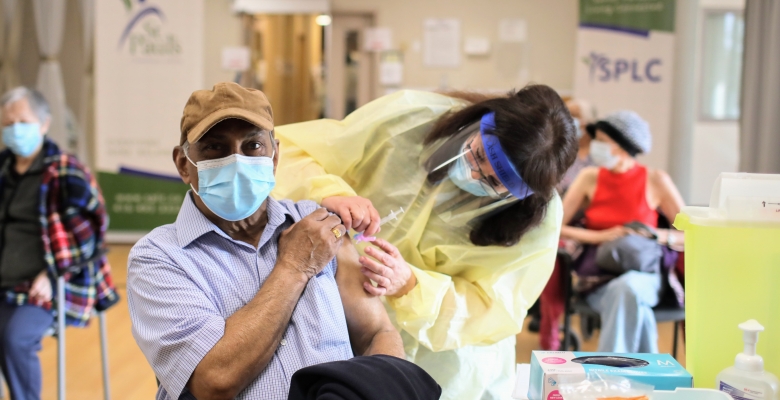
Senior Persons Living Connected has curated information to help seniors in our community get the COVID-19 vaccine. Click the links below to find out whether you are eligible for the vaccine in your area.
SPLC Vaccination Appointment Support
To help more seniors in our community, SPLC is now offering support with vaccination appointments in the community.
This service is for seniors living in Scarborough. SPLC can assist with booking their appointment, ensure they have transportation to the clinic, and provide translation support.
To access these important services, call SPLC at 416-493-3333.
Scarborough
To find out if you are eligible for the vaccine in Scarborough, please click the link. www.scarboroughcovidvaccineclinic.ca
York Region
To find out if you are eligible for a vaccine in York Region, please click the link. https://www.york.ca/wps/portal/yorkhome/health/yr/covid-19/covid19vaccinationclinics/04covid19vaccinationclinics
City of Toronto
Some pharmacies in Toronto are offering the vaccine to people over age 60. Click the link to find a pharmacy near you. https://covid-19.ontario.ca/vaccine-locations
For other vaccination sites in Toronto, check the provincial booking system to see if you are eligible. https://covid-19.ontario.ca/book-vaccine/
For more information, see the vaccinations guidelines established by the Province of Ontario.
For seniors who need help getting to a vaccine appointment, the City of Toronto is offering support. Find out how to book a ride: https://www.toronto.ca/news/city-of-toronto-and-partners-announce-vaccine-equity-transportation-plan/
Vaccine Clinics at Our Housing
Recently, seniors living in our housing were offered a first or second dose of vaccine against COVID-19 that we organized in collaboration with the tremendous team from Scarborough Health Network.
Here are some important points about the vaccines.
- The vaccines are safe for seniors.
- Vaccination is a 2-dose process.
- The vaccines cannot infect people with COVID-19.
- There is a small chance that you may still get COVID-19 after vaccination.
- Currently, there is no information on how long the vaccine’s protection will last. If vaccine protection decreases, a booster dose may be recommended in the future.
- Until there are enough vaccines for everyone, and until we know that the vaccine prevents the spread of most COVID-19 infections, it is important to continue physical distancing, wearing a mask, and staying home if you are sick
COVID-19 Vaccine information from Toronto Public Health
Below are a series of questions and answers from Toronto Public Health. For the full information, visit the City’s website.
Please note this information is available in many languages, including: Arabic, Simplified Chinese, Traditional Chinese, French, Greek, Korean, Somali, Tamil, and Urdu.
The vaccines contain instructions to tell our cells to make a protein that is found specifically on the coronavirus (which is the virus that causes the COVID-19 illness). These “spike proteins,” although harmless to us, will trigger our body to start making antibodies. Our new antibodies will protect us from illness if we are exposed to the coronavirus.
The vaccines do not contain the virus and so it cannot give us COVID-19.
At this time, there is no information on the long-term protection with this vaccine. There is a small chance that you may still get COVID-19 after being vaccinated. It is still important for everyone to continue with public health measures like wearing a mask, physical distancing, washing hands often, and staying home when sick until vaccines are more widely available and we can be sure that the vaccine prevents the spread of most COVID-19 infections. Health care and other staff must still wear personal protective equipment (PPE) even after they have been vaccinated.
Pfizer-BioNTech’s vaccine can be given to people 16 years and older with 2 doses at least 21 days apart.
Moderna’s vaccine can be given to people 18 years and older with 2 doses at least 28 days apart.
The vaccines are safe for seniors and people with stable health conditions such diabetes and high blood pressure. People with stable hepatitis B, C or HIV, may receive COVID-19 vaccines. People with food, insect bite, medication or environmental allergies can get the vaccine as long as they do not have an allergy to any of the vaccine ingredients. If you have allergy concerns, we recommend reviewing the list of non-medical ingredients in the vaccine in advance of getting it, or speaking with your family healthcare provider.
Note that it was recently announced that Health Canada approved an additional vaccine made by AstraZeneca-Oxford. We will provide updated information as it becomes available through the City of Toronto.
There is a small chance that you may still get COVID-19 after vaccination. Currently, there is no information on how long the vaccine’s protection will last. If vaccine protection decreases, a booster dose may be recommended in the future.
What are the side effects and risks?
Some people may have side effects from the vaccines. Common side effects include:
- redness, pain or swelling at the injection site
- headache, feeling tired, muscle aches, joint pain
- fever, chills, nausea, vomiting
- pain or swelling under the armpit (in the Moderna vaccine only)
- enlarged lymph nodes (this is less common)
Side effects are more common after the second dose. Side effects usually last one to three days. The side effects can be a sign that your body is developing an immune response to the vaccine. In rare cases, serious allergic reactions (anaphylaxis) can occur. Allergic reactions can be treated and are usually temporary. Seek medical attention if you have trouble breathing, hives, or swelling of the face and throat. If you have a reaction to the vaccine, speak with your health care provider to report the symptoms directly to public health. Public health will track reported side effects to ensure vaccine safety.
Delay vaccination if you: have a fever or COVID-19 symptoms. COVID-19 vaccine cannot be given with other vaccines. If you have just received a vaccine, wait 14 days before getting the COVID-19 vaccine.
Speak with a health care provider first, if you:
- are pregnant, could be pregnant or are breastfeeding
- have a bleeding disorder or weakened immunity due to illness or treatment
- had an allergic reaction within four hours after receiving your first dose of the COVID-19 vaccine
- Do not get this vaccine, if you:
- have known severe allergies/reactions to any vaccine ingredients, including polyethylene glycol or tromethamine (in Moderna vaccine only)
- had a severe reaction to your first dose of COVID-19 vaccine
Until there are enough vaccines for everyone, and until we know that the vaccine prevents the spread of most COVID-19 infections, it is important to continue physical distancing, wearing a mask, and staying home if you are sick. Health care and other staff must still wear personal protective equipment (PPE), even after vaccination.
The vaccine may cause symptoms while your body develops immunity, similar to other vaccines (e.g. flu shot). Side effects / reactions usually last for only a few days.
Look for:
- Redness, pain or swelling where the needle was given
- Headache, feeling tired, muscle aches, joint pain
- Fever, chills, nausea, vomiting
- Pain or swelling under the armpit or enlarged lymph nodes (less common)
If you have reactions that are serious or lasting more than a few days, or you are concerned about the reactions you are having, please call your family doctor.
It has been reported that people with the vaccine may still get COVID-19 and be asymptomatic. For this reason, it is especially important that you continue to protect all in our community until everyone has had their vaccine.
Also note that it may take up to two weeks after vaccination for your body to build good immunity against COVID-19.
You need to continue with public health measures like wearing a mask, physical distancing, and staying home when you are sick until more people are vaccinated.


